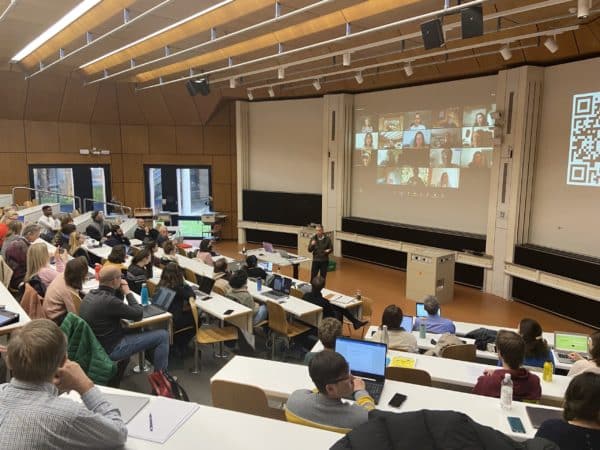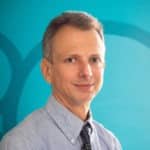
Academic Citizens’ Assembly – 02.04.2022
A democracy is simply a governance system, leading to decisions that should reach the goals of society. So what are those goals? Our collective wellbeing, today and tomorrow, depends on simultaneously satisfying all fundamental human needs and healthy ecosystems, the two being closely linked.
The current democratic debates rarely address fundamental goals, usually debating intermediate and more often than not technical items. Yet, emergencies such as climate change call for out-of-the box conversations on recurring questions. How should the economy grow? Perhaps it shouldn’t grow at all, and a better, smaller economy, focused on universally accessible essential local services would improve both society and ecosystems. How to create more jobs? Perhaps, but the purpose of jobs is more important than the number, and why is a job needed to participate in society in the first place? How to promote electric cars? Why – are we trying to protect profits, or help people meaningfully participate in society? In which case we must ask: why is everything in the “wrong” place, creating the need for transport? How to significantly increase food production to feed the world in 2050? Shouldn’t we first consider that today’s food system could theoretically feed 35 billion? Instead we might need less but better quality food, produced differently.
As we gathered researchers from EPFL and BSL for the 2020 inaugural symposium on societal transition pathways, we realized the necessity to define an additional democratic process that would help people learn about such essential topics, and most importantly, involve them in building the answers, in a respectful, well structured deliberation. We called this process the Academic Citizens’ Assembly.
This is exactly what citizens’ assemblies have been doing successfully for several decades, with many excellent examples in over a dozen countries. The process is simple: a representative group of citizens come together to learn, deliberate and write proposals, and vote, developing a list of recommendations on their topic. Typically around 100 people are selected, with the right balance by age, gender, education etc. While citizens’ assemblies make excellent recommendations, it is difficult for parliaments or the broad population in a referendum, without the benefit of going through the learning and deliberation themselves, to accept and implement the conclusions, especially on complex and socially divisive issues.
The Academic dimension of the assembly is an invitation for science-driven minds of all horizons to move beyond the role of external experts, and participate in the discussion process. This dimension is disruptive for smaller size assemblies that can potentially gather all stakeholders of a decision-making process.
The Academic Citizens’ Assembly (ACA) has also been designed as a universally inclusive citizens’ assembly, using a process and tool to allow it to scale to any size, including the whole population of a city, canton, or country. It aims to become representative by including all people concerned by a decision, which means all who live in the area for which the decision is being made.
The first prototype of Academic Citizens’ Assembly took place online in June 2021, focusing on Food and Energy governance. A more ambitious ACA 2022 took place simultaneously at EPFL and online on Saturday 02.04.2022, using the process and tools that could potentially work with hundreds of thousands or more participants.
ACA 2022, focused on Swiss climate action, had two main goals: (1) propose climate action with 75% or better support, and (2) test the proposed process and tools.
How successful was ACA 2022?
ACA 2022 was a one-day assembly, with 70 people in 8 groups of 8-9 people working in three sessions, choosing topics, deliberating solutions and proposals, writing proposals, and individually voting on proposals. The process was designed to converge, with voting results of sessions 1 and 2 forming the basis of work for the next session. The opening survey showed a good balance by gender and Swiss residency, and overall highly educated and proficient in English – self-selected as the event was held in English to include Swiss language regions without translation. A total of 216 proposals were submitted, and 11’971 votes cast during the day.
The closing survey showed a very high level of inclusion (87%) and respect (98%), with clarity of goals and process around 66% and overall organization at 72%, details in the report.
Each group for each session had an observer; a total of 24 observer’s sheets indicate an excellent quality of interaction, such as relaxed atmosphere (63%), soft power prevalence (96%), people treating each other as equals 80%, or openness of participants to change position (96%).
While ACA 2022 was a prototype of a complex process, the assembly worked well, reaching all main goals. We learned a lot about the process and tools, and produced dozens of relevant recommendations for climate action. Please find below a summary of results, if interested please read the ACA 2022 Report.
Transport+Urban Planning
- Concept of 15’ city: everything reachable within 15’ + Encourage sust. urban planning: services, living & work are concentrated
- Encourage biking/walking by replacing car lanes with bike/pedestrian spaces and trees + Improve bike culture/skills/behaviors
- Reallocate climate-harmful transport subsidies towards clean and affordable transportation
Agriculture+Food
- Adapt food-type consumption to anticipated future conditions: much less meat, select climate-resistant crops
- Link subsides to good farming practices (biodiversity and carbon footprint) + Carbon tax on imported food
- Reduce meat consumption in schools by introducing progressively more vegan options, until 100% vegan, bio, regional, seasonal
Education+Engagement
- Every Swiss resident (CH, permit B, C) participates in a Citizens Assembly organized by municipality (1 day off/year)
- A quota in mainstream media (some minutes per day, advertising space) to raise awareness on climate change and on solutions
- Promote culture and arts to change paradigm from consumption society to sustainable one; different media (movie, books, theater)
Buildings
- Replace housing heating in Switzerland within 5 years
What happens next?
Are you interested in deliberative democracy for your city, commune, NGO or company? Help us meet organizational and political leaders. We also plan to include assemblies in scientific “living labs” around the transition to net zero, conduct a mini-ACA during the K3 Kongress zu Klimakommunikation on 14.09.2022 in Zurich, and share our experience with other democracy initiatives.

